Good-bye Maoriland: Mō te riri, mō te iwi
On October 26th 2017, Chris Bourke’s Good-bye Maoriland: The Songs and Sounds of New Zealand’s Great War (AUP) was launched at the National Library. Chris has been based at the Library since being awarded the 2015 Lilburn Research Fellowship, supported by the Alexander Turnbull Library and Lilburn Trust. Here we reproduce the launch address by Kate Hunter, with her kind permission, accompanied by photographs of the event.
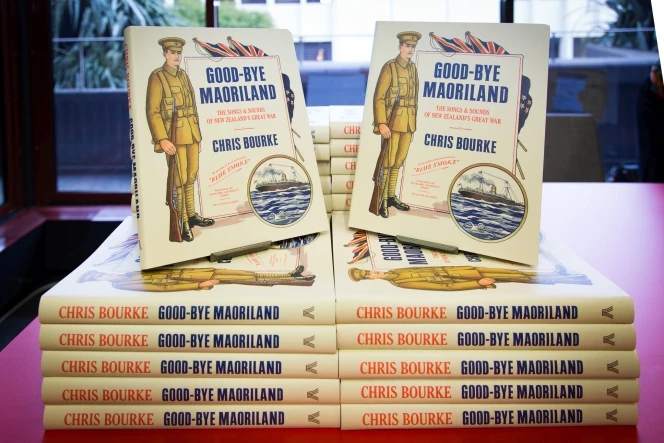
Photograph by Mark Beatty
Tēnā koutou katoa, tēnā koe Chris,
After the many long, and often lonely hours of authorship, it is always the collective event like this that sends a book properly into the reading world.
Book launches always bring together a mix of people: from those of us who attend these kinds of events reasonably regularly – authors, publishers, chief librarians (who are also authors) – to those whose passion for collecting, or their role as archival custodians, has brought them into the orbit of one particular author.
And then, there might be relatives of the author, or of the people in the book for whom this particular book is very precious. And those descendants may not be biological – for those who sing, play instruments or wear uniforms that carry the mana and responsibility of centuries of tradition, this book may become part of their whakapapa. So we are thrilled for all sorts of reasons, Chris and family, to be here with you tonight to celebrate the publication of Good-Bye Maoriland.
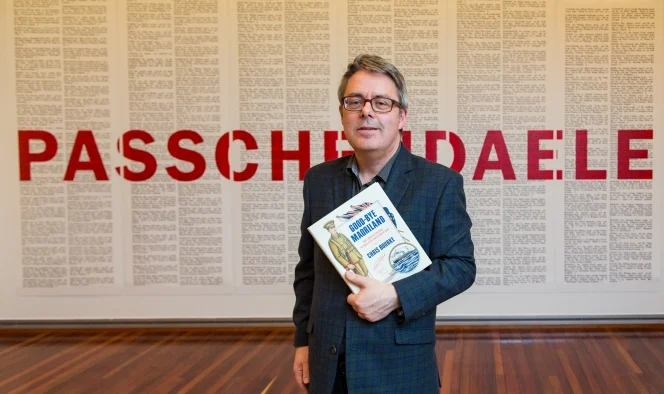
Good-bye Maoriland author Chris Bourke in the ‘Passchendaele’ exhibition, Turnbull Room, National Library. Photograph by Mark Beatty
Good-bye Maoriland author Chris Bourke in the ‘Passchendaele’ exhibition, Turnbull Room, National Library.
It is of course almost irresistibly tempting to describe Chris’s book as a musical production in which the orchestra, players, set designers, props and wardrobe have all been brought together under the direction of the Maestro. Having read the many examples of musical reviewing in the book, one’s taste for the acerbic turn of phrase is certainly whetted… how many of us long to have written of the iconic song It’s a Long Way to Tipperary that, “as music, is beneath contempt”, as the New Zealand Free Lance writer did? Or to claim, as the music critic for the Truth did, that of all the musical offerings in Christchurch “none of these can put on a programme that is worth sacrificing a fireside and a magazine to hear”?
But no such cattiness would be called for when writing about Good-Bye Maoriland!
There is tempo and colour in the score: Allegro (“bright and lively” I hear my piano teacher Miss Buckhorne instruct – twin sets in pale blue, lemon and pink filled her wardrobe, pearls at her neck and a ruler in her hand – my knuckles still twitch at the memory!). Yes, bright and lively! There are popular tunes and patriotic marches, brass bands aplenty, and The Marseilles on a tin whistle in the street.
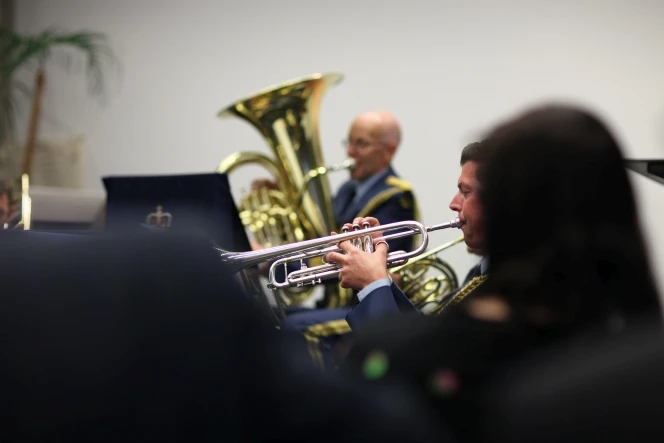
The RNZAF Brass Quintet perform during the book launch. Photograph by Rob Sarkies
But there is adagio – hymns in subdued voices or a lone sentry humming under his breath, the recurrence of O God Our Help in Ages Past with its comforts of divine shelter from the stormy blast.
The cast are outlandish and ordinary, and not our usual World War I types: the wonderful Dave Kenny, six foot tall and 15 stone, floating onto the stage in a short muslin dress and a golden wig; and the more petite Stan Lawson performing as a femme in a concert party in front of Premiere William Massey in France, convincing enough to make the Tommies ask where the “real girl came from” and to make the New Zealanders homesick. And, the heart and soul of any show he was in, Theo Trezise, the sapper who created magic in his silk tights and sparkling head-dress.
Then there are the men who smuggled their instruments in their kits such as Alexander Aitken, who on Gallipoli provided muted concerts on his violin each night. “My E-string had gone”, he remarked in his memoir, “but a resourceful Aucklander unravelled the strands of a short length of six-ply field telephone wire, and these substitutes served until I bought proper strings in Cairo next April”. I hope military historians have taken this into account in their assessments of the campaign.
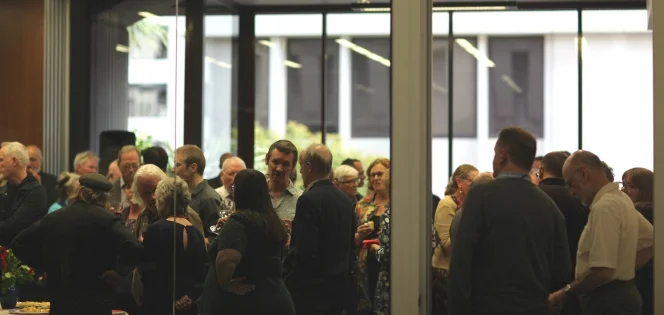
Photograph by Rob Sarkies
This same cast, for all of their brightness and glamour, even just warmth and resource, bring us to the minor keys. The maestro does not let us, his audience, forget where we are and why: for all the patriotic singing and fundraising concerts with bunting and flags, for all the morale boosting performances, New Zealand was at war. Dave Kenny’s death in 1918 from prosaic appendicitis prompted The Triad’s usually cutting reviewer to write:
So many brave have fought for us and bled.
It brings things nearer now Dave Kenny’s dead.
They died for us, these others, all these Daves
And Toms and Jims and Joes…
The image of Theo Trezise and his troupe returning to the dressing rooms “to clothe themselves once more in the sober garb of the NZEF” takes the sparkle out of the War.
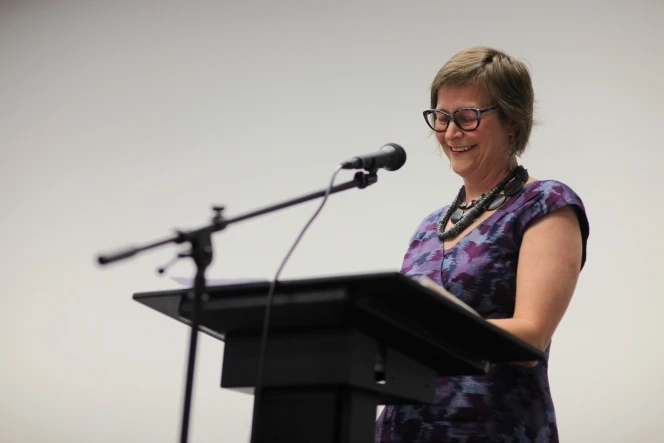
Kate Hunter launching Good-bye Maoriland at the National Library. Photograph by Rob Sarkies
Kate Hunter launching Good-bye Maoriland at the National Library.
And then there is the full palette of Māori music and musicians rendered here in Good-Bye Maoriland that will stay with readers. There are haka, of course, but the lament expressed in waiata creates space for a depth of emotional responses to the Great War that will enrich the understanding of the War for all of us.
Henare Mokena Kohere’s waiata greeting the much-diminished Māori contingent as they arrived off Gallipoli at the end of 1915 tells its own story of hearts full of pride and sacrifice and grief and love that cannot have been exclusive to Māori, but is so beautifully expressed by waiata:
E te ope tuatahi
E kore rawa e mutu mai
Te aroha i, a au e
Me tangi kau ata ki te roa a Ihapa e
Kei te rēti o tinana
Mō te riri mō te iwi
Aue aue e te tau
(The first battalion / I will never stop feeling deep love for them / I have to cry the length of the Egypt campaign / Your body has been lent to others / For the war, for our people / Oh what love for you my darling.)
Tempting though the musical analogy is, books don’t sing or play, or jangle or tinkle. They whisper – “psst” – as the pages turn, and maybe creak as our fingers slide over the paper. Yet Chris has written a book that has created in my head a crowd around a piano, a rowdy concert hall, the laughter of audiences indoors and out, and the massed voices of congregations, men in French estaminets, and cinema audiences standing for the national anthem before the news reel. The soundtracks of our own lives help make this book noisy – our piano lessons, marae and church childhoods, our fathers who sang around the house. It will connect to readers, and they will connect to the music and the soundscape and people in its pages.
Congratulations to Auckland University Press for a beautiful production, and my warmest congratulations to Chris for a wonderful achievement. May it bring the house down! Ngā mihi nui.
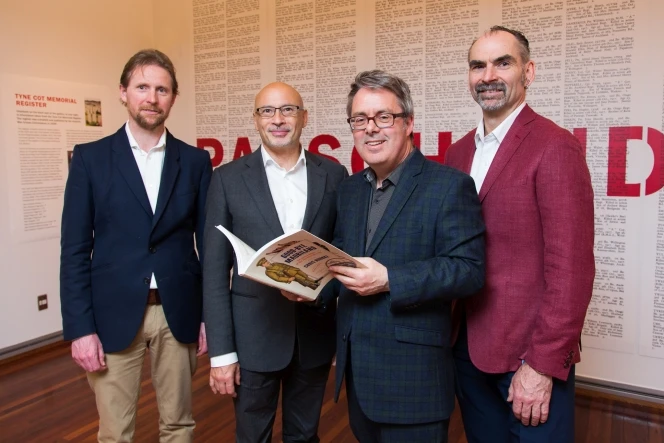
Chris Bourke with (l-r) Michael Brown (Curator, Music), Chris Szekely (Chief Librarian), and Keith McEwing (Assistant Curator, Music). Photograph by Mark Beatty
What a great launch speech!! Thanks for sharing it. And I now can't wait to buy the book.